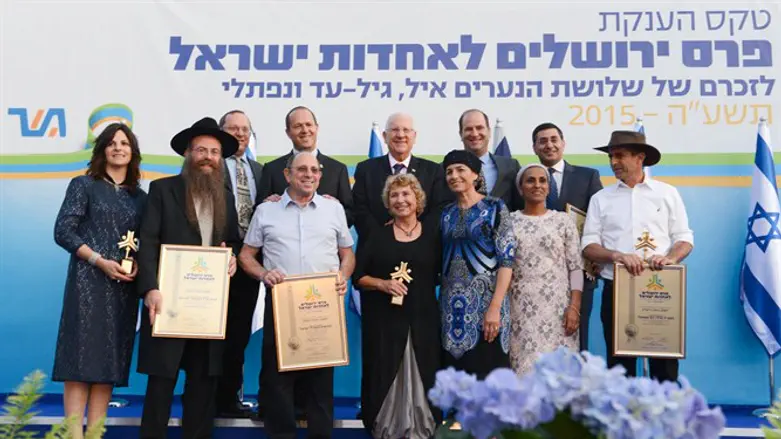
In memory of the three teens kidnapped and murdered three years ago – Eyal Ifrach, Gilad Shaer, and Naftali Frenkel - the winners of the Jerusalem Unity Prize will receive awards at the home of President Rivlin on June 7th. In addition, Unity events and celebrations for UNITY DAY have been planned for all around Israel and the world "to celebrate what brings our community together rather than what divides us", according to event organizers.
The international winner is Limmud, and the winner of the national category is Tzav Pius. The award in the local category will be presented to two recipients. The first non-Jewish candidate for the prize, award recipient Dr. Janaan Frajj Falah, has worked to advanced initiatives that bridge social gaps between women of diverse backgrounds in Israel’s North. The second winner is Kehilat Hadar, based in Haifa, which works to promote social and cultural harmony between local groups of various religions and ethnicities.
What began as a modest idea to offer tribute to the memories of the three teenagers, Gilad Shaer, Eyal Ifrach and Naftali Frenkel, has since grown into an international phenomenon attracting participation of millions of people and hundreds of communities across the globe.
When Jerusalem Mayor Nir Barkat visited the three families during the week of mourning, he spoke of an initial idea to dedicate an award in their memories and salute the remarkable spirit of global Jewish unity which defined the 18 days when the boys’ fates remained unknown.
The Mayor partnered with the families and Gesher, the organization working to bridge gaps within Israeli society, to create the Jerusalem Unity Prize and nominations for individuals and organizations working towards building unity began arriving.
"It became quickly clear that Jewish unity was an ideal which is often only spoken of when it is missing- but too rarely celebrated when it succeeds", said organizers of the Prize. They decided that the day the prize would be awarded needed to be more than just a local ceremony - and could be turned into an ambitious approach to educate on the power of communal unity, and with that vision, Unity Day was born.
The plan was developed for an annual day, on or close to the memorial anniversary of the three boys, when communities across Israel and around the globe would come together to find that common ground. It would be a day when people would be willing to honestly confront the differences within the greater community - while asking the tough yet necessary questions of how to overcome those divides.
Since June 3rd, 2015 when the first Global Unity Day was celebrated, its popularity has exceeded the organizer's most optimistic expectations. Over a million students, families, and groups around the world have participated. Programs range in size from large-scale gatherings in community centers and synagogues to casual conversations on street corners and parks, where people of different backgrounds welcome the chance to get to know each other. While Israel remains the epicenter of the day with hundreds of thousands participating through the Education Ministry and partnerships with the IDF and the local councils, communities as far away as Finland, Hong Kong, Russia, and even Jamaica participate with equal passion.
Communities around the world are gearing up for Unity Day 2017 on June 7th.
Participating in a New York event last year, Racheli Frenkel, mother of Naftali, stressed that she does not need the world to remember her son Naftali - that will be the job of his family and friends. But what she does want is for the world to remember how the global community behaved during those eighteen days of uncertainty and to always remember the power we have as a people when we choose unity over division.